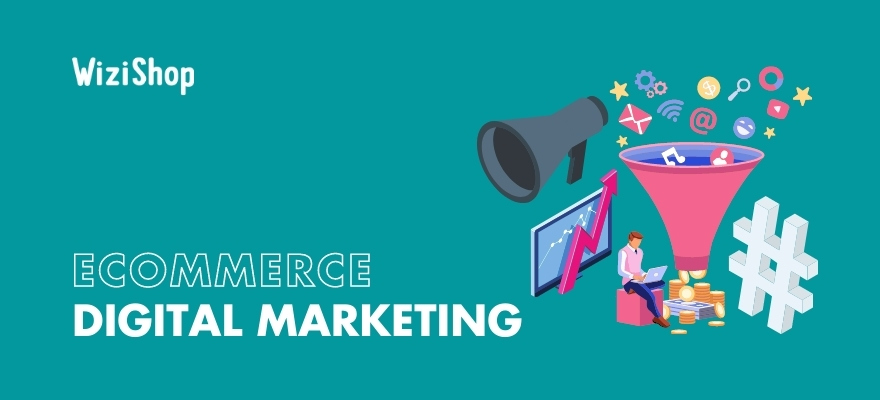Today’s consumers are increasingly taking advantage of the benefits of online shopping, and this creates amazing opportunities for your ecommerce business. However, the wonderful world of internet commerce is competitive.
Simply having an online presence isn’t enough to get your target audience to your business’s website. With millions of ecommerce websites all vying for the spotlight, how can you get your website the attention that it needs to boost sales?
The answer is found in developing and executing a thoughtful digital marketing campaign, one of the top skills needed for ecommerce success.
What is digital marketing?
For many internet commerce business models, the days of relying on television ads, billboard signs, and print newspaper ads to help draw customers have passed.
Driving online shoppers to your ecommerce website is often most effective when you reach those users while they’re using a connected device.
Digital marketing describes all types of online marketing methods. These are methods that reach consumers through web browsers, social media networks, email, mobile apps, and more.
Benefits of digital marketing for ecommerce businesses
Digital marketing shouldn’t be considered a side component to your ecommerce marketing efforts.
Regardless of the products that you’re selling through your website, you’ll need to connect with customers in a direct, timely, and cost-effective way. This is what you can achieve when you design an effective digital marketing campaign.
There are multiple digital marketing channels that you can use to varying degrees in your ecommerce business’s marketing campaign. While digital marketing is essential overall, you may find that some of the methods are more applicable to your business model and target audience than others.
When you include a well-designed digital marketing strategy in your ecommerce marketing checklist, you can expect it to foster business growth and increase product sales in the following critical ways.
1. Promote your products or services online
When products were sold mostly in physical stores many years ago, one of the purposes of marketing was to drive customers to stores in search of those products. Some marketing in stores at the point of purchase also enticed consumers to choose a specific product over other options at the primary decision-making moment.
Because today’s consumers are researching products or services online before placing an online order, the ability to promote your store offerings online is essential. Through digital marketing, consumers who decide to explore your products or services in greater detail only need to click a link to reach your ecommerce website.
Removing roadblocks and streamlining the process can encourage greater results from a marketing campaign. Keep in mind that digital marketing can be used to promote new products, specific features, or uses of a product.
2. Gain access to a larger audience
The ability for a site to potentially reach millions of consumers through a well-planned online marketing strategy is significant. Consider that many social media posts, blog posts, emails, and other forms of marketing can be shared by those who see the message to all of the user’s other contacts.
When your content is engaging and worth sharing, it can potentially go viral. In the process, it can increase your business’s or product’s popularity almost overnight, possibly leading to a boom in site sales.
However, an ecommerce store’s marketing content doesn’t need to go viral to have a considerable reach!
For example, adding the right hashtags to a tweet on Twitter can put your post in front of thousands of others who follow those hashtags. These are people who your store may have not otherwise reached through traditional marketing channels.
3. Build your reputation
In addition to promoting your products and driving traffic to your website, digital marketing plays a crucial role in building your reputation. Your marketing channels, written content, graphics, and other elements on your website and other platforms combine to help establish your ecommerce brand’s image.
At the same time, onsite and offsite reviews about your products and business will affect the reputation of your store.
The internet provides you with a way to directly reach out to those who are unhappy with your business and to correct the issue. By utilizing all of these resources, you can take full control over your business’s reputation.
4. Save money
The reach of digital marketing campaigns and the excellent return on investment can provide lots of bang for your buck through a well-designed online campaign. Note that many effective strategies, such as social media marketing, are free.
What’s more, when you run paid ecommerce advertising campaigns, you’ll have access to comprehensive, real-time data. Through detailed analytics, you can make timely adjustments to your marketing campaigns to save you money in the long run.
5. Stand out from the competition
Defining what makes your products or ecommerce business different from the competition is only half the battle. You also need to convey those important differences to your customers.
This is easier to do online, such as through two-way communication, video marketing messages, and other efforts. By taking advantage of these opportunities, you can establish relationships with your customers in ways that are much harder to achieve through traditional marketing methods.
6. Influence customers’ buying decisions
Digital marketing touches consumers throughout all stages of the buying process. A great digital marketing strategy includes showcasing your products’ features strategically to help influence the buying decision.
It also involves driving traffic to your website at the moment when the customer is ready to make a purchase. If customers abandon items in their shopping cart, you can even use various digital marketing methods to encourage them to return.
7. Boost sales in a short amount of time
It could reasonably take weeks or longer to design a traditional marketing campaign with TV ads, mailers, and more. Through digital marketing, you can see an impressive, immediate response from a simple social media post.
Email marketing messages can be dispatched and opened immediately. These are only a few examples of how you can drive traffic to your website and increase product sales quickly through digital marketing efforts.
Digital marketing channels for ecommerce businesses
Regardless of your business model, products, or services, you can see that digital marketing should take a front-and-center position in your marketing strategy. The opportunities to connect with your target audience online are numerous.
This gives you incredible flexibility to incorporate various channels into your campaign. Here are some of the primary digital marketing channels used by ecommerce businesses to help you begin!
Content marketing
Today’s consumers want to make purchases from businesses that care about them rather than those that are focused only on making a sale.
Content marketing can add true value to your customers in various ways. For example, this might include seasonal tips in a blog post, a how-to video, or other types of meaningful content.
In addition, content marketing plays a vital role in maintaining awareness and building loyalty. It can also be used to position your ecommerce business as a leader or expert in your field.
Email marketing
Email marketing is among the more established digital marketing methods, but its use has evolved over the years. At one time, an email marketing campaign consisted of sending a generic message out to a bulk distribution list.
This list may have even been purchased rather than built through an opt-in campaign, which often leads to messages being labeled as spam.
Today’s email marketing campaigns are more personalized with higher open rates. Spam can quickly and dramatically impact your business’s reputation, so opt-in campaigns are now standard.
They may be used to stay in touch with customers with periodic newsletter announcements about specials and more. Customized emails may also be sent out at key times, such as after a customer makes a purchase.
SEM
There are two primary methods for using search engines to reach your target audience. Search engine optimization (SEO) is the organic method. While it’s effective, it can take several months or longer to see results from an SEO campaign.
Search engine marketing (SEM), on the other hand, is a paid search method that can deliver immediate results.
One example of SEM is Google Ads. Through Google Ads, you select the keywords that you want to target and establish a budget for your campaign. Once the campaign is active, your website may be placed in a top position when users search for the targeted keywords.
SEO
Search engine optimization improves the visibility of your website through online searches. As many as 35% of online shoppers start their process with a Google search, according to data from PowerReviews.
Search engine algorithms are tweaked frequently in order to improve the user experience. This means that SEO should receive your regular attention as an ecommerce business owner.
A comprehensive SEO campaign involves more than incorporating targeted keywords in your static website content and blog posts. It includes building backlinks, establishing relevance, using meta tags, and many other strategies.
Social media marketing
Your ecommerce business can establish a professional profile on social media platforms like Facebook, Twitter, YouTube, Pinterest, and others at no cost. You’re at liberty to build a following and to make posts at any time.
This gives you a free, direct way to connect with your followers. Through the use of hashtags and other measures, you can expand your reach dramatically.
You can also promote your business profile and various posts through paid social media advertising. These platforms generally enable businesses to adjust marketing campaigns to reach specific audiences and to control spending.
Digital marketing: an absolute must for online stores!
These are only some of the many digital marketing channels that ecommerce entrepreneurs use to boost site traffic, increase brand awareness, and improve the customer experience.
Most ecommerce businesses leverage the power of these methods cohesively through a well-designed campaign. They also make adjustments based on analytical review so that their results are increasingly refined.
In addition to these channels, some online stores use other strategies to expand their reach within the confines of their budget. Display or banner ads, mobile app marketing, affiliate marketing, and behavioral remarketing are other options that could have a place in your digital marketing campaign.
Whether you’re launching a new ecommerce business or searching for ways to increase online traffic strategically, research all of these avenues carefully. You should take full advantage of all the options that make sense for your site.
However, be sure to take the time to learn the ropes fully for each channel. This will ensure that you’ll be able to optimize its benefits for your store!










